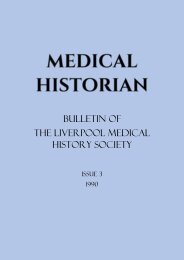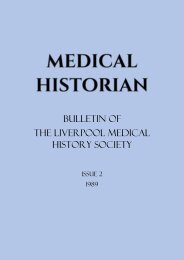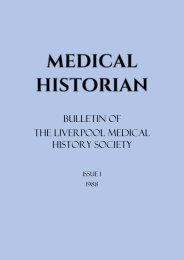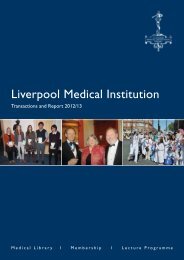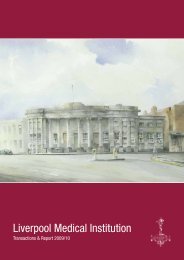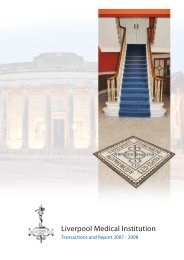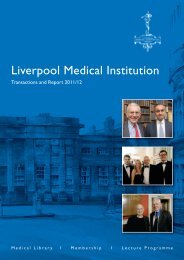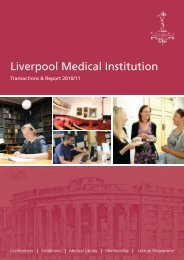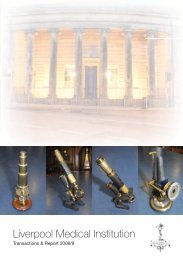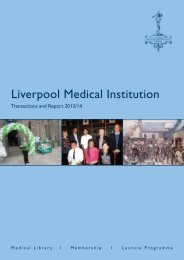LMITransactions&Report2014-15
You also want an ePaper? Increase the reach of your titles
YUMPU automatically turns print PDFs into web optimized ePapers that Google loves.
LMI Transactions and Report 2014 - 20<strong>15</strong><br />
battle for safety in anaesthesia had now been largely<br />
won and thought that is was time to take this further<br />
outside the operating theatre. He discussed preoperative<br />
assessment which tried to predict patients<br />
who may have poor surgical outcomes. He highlighted<br />
cardiopulmonary exercise testing, one area in which he<br />
was currently researching. He quoted a paper by<br />
Musallam K et al 3 which highlighted the incremental<br />
risk of anaemia with other comorbidities such as<br />
cardiac disease, COPD, renal impairment, all being<br />
associated with a higher mortality. Therefore, as<br />
Shander A et al 4 had highlighted, perioperative patient<br />
blood management is vital for good outcomes. This<br />
includes optimising haemopoiesis, minimising blood<br />
loss and bleeding and the improvement of tolerance<br />
of anaemia. He wondered how many of us have been<br />
presented with a patient on the day of surgery who<br />
had been inadequately optimised but we all felt the<br />
pressure to continue. Almost always we manage to<br />
get the patient through anaesthesia and surgery but<br />
the real problems seem to start a couple of days<br />
afterwards where inevitable consequences often<br />
become complications. Therefore individualised care<br />
must be the aim of pre-operative assessment.<br />
Professor Pearse then looked at the surgical event and<br />
highlighted the importance of checklists and the<br />
variable use of the WHO checklist across Europe. He<br />
spoke about other factors that may help to improve<br />
outcomes such as minimally invasive cardiac output<br />
measurements and the use of epidural anaesthesia. He<br />
thought that these were very important and<br />
anaesthetists in general were not very good at<br />
highlighting the necessity of putting their case across<br />
strongly for pieces of equipment or better nursing<br />
care.<br />
Professor Pearse discussed events occurring early after<br />
surgery and reminded the audience that acute organ<br />
injury can be a cause of long-term harm. This can<br />
include acute lung injury, sepsis-related myocardial<br />
injury and loss of muscle function. He quoted a paper<br />
Squadrone V et al 5 which showed that the early use of<br />
CPAP (Continuous Positive Airway Pressure) for the<br />
treatment of post-operative hypoxaemia can<br />
significantly reduce post-operative respiratory<br />
complications. He also highlighted the association<br />
between post-operative troponin levels and mortality.<br />
Post-operative rises in troponin were associated with<br />
a much higher mortality than similarly raised levels<br />
found in patients admitted through A&E.<br />
Professor Pearse went on to look at events later after<br />
surgery and showed a paper by Khuri et al 6 which<br />
demonstrated those with either pulmonary or wound<br />
complications had a significantly lower 5 and 10 year<br />
survival after surgery. This was again demonstrated for<br />
acute kidney injury after cardiac surgery 7 . Acute<br />
kidney injury was a key cause of chronic kidney disease<br />
as a result of loss of nephrons during each episode. He<br />
reminded the audience that the serum creatinine<br />
actually falls after surgery and therefore if it is raised,<br />
this is evidence of a much bigger injury than a rise<br />
associated with no surgery. Finally, he thought that<br />
anaesthetists should see some patients in postoperative<br />
clinics because they tend to be better at<br />
looking at the whole patient rather than just the<br />
outcome of surgery. They can then refer patients to<br />
relevant specialists if organ dysfunction has worsened<br />
as a result of these surgical episodes.<br />
Professor Pearse thought that surgery could often be a<br />
sentinel event with this being the first contact that<br />
many patients will have with a doctor. This can lead to<br />
the unmasking of many co-morbidities which often<br />
need to be treated prior to surgery and anaesthesia.<br />
He highlighted a number of quality improvement<br />
initiatives, such as the publication of performance data<br />
for individual surgeons and the way that cardiological<br />
services have been reorganised over the last 10 years<br />
showing a major improvement in 30 day survival<br />
following STEMI. He spoke about the EPOCH trial<br />
(Enhanced Perioperative Care for High Risk Patients)<br />
which is a project to implement an integrated care<br />
pathway for patients scheduled for emergency<br />
laparotomy. He described how healthcare can learn<br />
lessons from other industries and highlighted the way<br />
that the building of Crossrail in central London had<br />
changed building culture to greatly improve the safety<br />
of workers on the project.<br />
Finally he thought that the Royal College of<br />
Anaesthetists should be renamed that Royal College of<br />
Perioperative Medicine and reminded the audience<br />
that the College was soon to roll out its initiative in this<br />
area.<br />
1 Lancet 2008;372:139-44<br />
2 NEJM 2009;361:1368-75<br />
3 Lancet 2011;378:1396-407<br />
4 BJA 2012;109:55-68<br />
5 JAMA 2005:293;589-95<br />
6 Ann Surg 2005:242;326-343<br />
7 Hobson C et al, Circulation 2009:119;2444<br />
Ewen Forrest<br />
28



